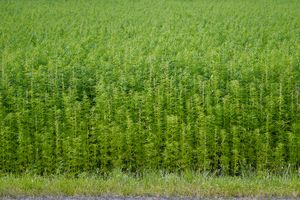NASDA-As Learnings on Hemp Grow, State Ag Officials Adapt Policies
 At the 2020 Winter Policy Conference of the National Association of State Departments of Agriculture (NASDA) yesterday, policy items addressing some of the implementation challenges that states have with the U.S. Department of Agriculture’s (USDA) Interim Final Rule (IFR) were passed.
At the 2020 Winter Policy Conference of the National Association of State Departments of Agriculture (NASDA) yesterday, policy items addressing some of the implementation challenges that states have with the U.S. Department of Agriculture’s (USDA) Interim Final Rule (IFR) were passed.
Two separate policy items were passed by NASDA Members including:
• A policy item focusing on extending the mandatory date of October 31st for states to change from pilot programs to approved USDA plans by Minnesota Commissioner of Agriculture Thom Petersen;
• A policy item calling for a hemp data reporting system by interim Wisconsin Secretary of Agriculture Randy Romanski
“We support an extension of the 2014 Farm Bill Industrial Hemp Pilot Program through the end of next year to facilitate states’ transition into an approved USDA plan” said NASDA CEO Dr. Barb Glenn. “With the vast majority of states needing to call on their state legislatures to be in compliance with the Rule, we need more time to stand up regulations that support the growth of our hemp industry.”
“States are doing what they can with limited resources to ensure regulatory compliance. Securing an electronic system that allows for states to routinely submit data to USDA will be crucial for state departments of agriculture. We encourage the USDA to work collaboratively with states to create a uniform and reliable data reporting system.”
At the conference, USDA Marketing and Regulatory Programs Under Secretary Greg Ibach announced deferment of the certified U.S. Drug Enforcement Administration (DEA) laboratory requirement to the 2021 season and new flexibility for disposal of non-compliant crops. The government will allow farmers to destroy “hot” hemp fields themselves, rather than having to hire a contractor to do it.
“We thank USDA for the work they have done this far, and we look forward to continuing our work with them to create a rule that will allow the hemp industry to grow. We are co-regulatory partners and we must provide our producers with a commonsense rule.”
NASDA’s organizational hemp policy was also amended to underscore the needs of states in regulating hemp and also called for clarification of federal law that allows hemp-infused products not exceeding federal concentration thresholds to enter interstate commerce. All three actions were complimentary to NASDA’s comments on USDA’s interim final rule on hemp which highlighted 10 major changes to the rule.
Hemp is a term used to classify varieties of cannabis that contain 0.3% or less THC content per dry weight as defined in the 2018 Farm Bill. NASDA adopted policy supporting the legalization and production of hemp for the first time in 2002, and since, NASDA has voted in favor of numerous policy items that support the growth of the industry and development of uniform standards for the regulation of this crop. Learn more about our work on hemp at www.nasda.org/hemp.
Source: AgriMarketing
